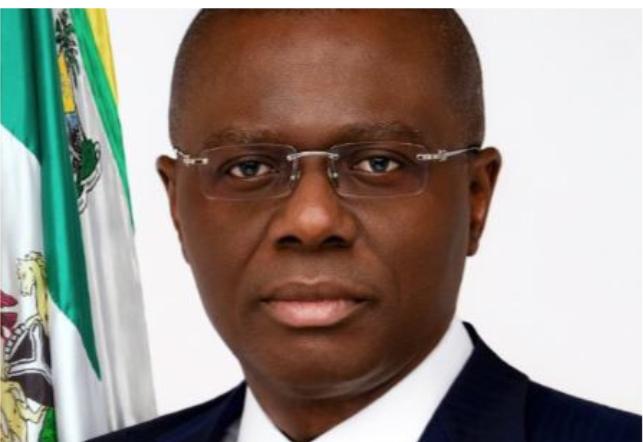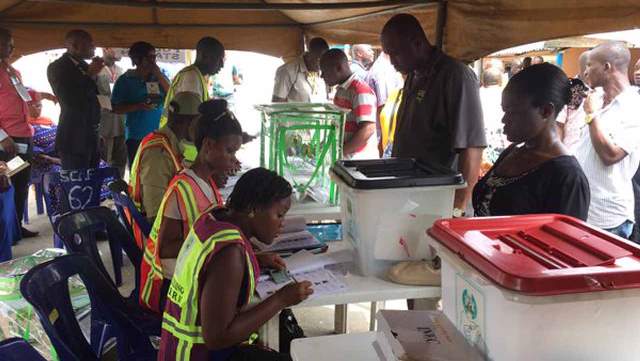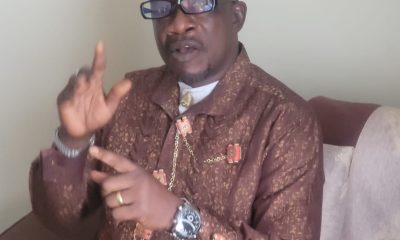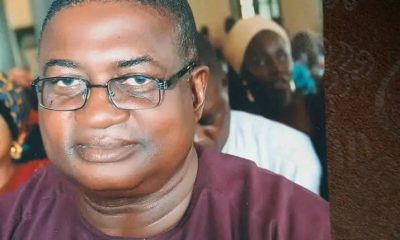OPINION
Achieving Slum to Neighborhood without Eviction in Lagos State

By Jerome-Mario Utomi
Recently, the Lagos State Building Control Agency (LASBCA) announced that it would commence the demolition of illegal structures constructed under high tension cables and others. The demolition exercise is expected to affect owners of structures constructed under power lines, which contravene the state’s Physical Planning Laws.
Significantly, there is no doubt that the present administrations in Lagos state, south west, Nigeria, have a sincere desire to move the state forward through fair and far-reaching policies that bothers particularly in creating an organized and livable environment for the citizens of the state.
Out of so much evidence, the above move by the Lagos State Building Control Agency (LASBCA), appears newest.Peripherally, there are also reasons that qualify this development as alluring.
Separate from the awareness that the Lagos State Urban and Regional Planning and Development Law prohibits building under the centre line of overhead electricity cables and should ensure that there should be a reasonable amount of distance between a property and high-tension wire, this opinion piece recognizes that this particular move again narrates the state government’s efforts to engineer sustainable development in ways that protects the present and the rights of the future generations, and most particularly help enthrone organized and livable environment for the citizens of the state.
However, beyond this applaud, stems some sets of concerns as the global community, especially development practitioners do not think that what the state government is doing in the nation of urban renewal/upgrade/regeneration is the best way of turning ‘Slum to Neighborhood’
To add context to the discourse, from recent reports by development practitioners, sustainable development and the related notion of sustainability are becoming increasingly important policy objectives for government at different levels as well as in the private sector. They suggest that there is a growing need to strengthen the conceptual understanding of different notions of sustainability and their implications. In particular, there is a need to design effective policies that aim to achieve sustainability objectives, and more importantly, to analyze the implications of the proposed policies.
From the above flows the ill inherent in the development efforts of the state.
Fundamentally, the state is yet to conceptualize governance as business that requires a series of objective analysis of implications of proposed policies. Tragically interesting is the awareness that the state has chronically become reputed for achieving urban related upgrades, renewal and developmental programmes more from a reactionary perspective and evictions as against being a function of proactive design of effective policies anchored on international best practices. This partially explains why they lie in wait for citizens to build in unapproved places before moving in with their bulldozers for demolition/eviction.
If not, Why is it that the state finds it difficult nipping illegal construction/unapproved buildings by the bud, but convenient to demolish after construction? Which one is easier and more cost effective; taking proactive mechanisms/steps that prevent Lagosians from building in unauthorized places, or deploying state’s resources to effect demolition of structures built in the full glare of the Lagos State Government? Most important/strategic, as a government, which one is the most noble and dignifying option; being reactive or proactive?
While answer(s) to the above is awaited, there is urgent need to underline that this act is by no means unique to the present administration in the state.
It may be recalled that demolition/forced eviction gained entrance into the state leadership lexicon in July 1990 when Raji Rasaki in his capacity as Military Governor of Lagos State and Ibrahim Badamasi Babangida (IBB) as Military President for yet to be identified reasons destroyed Maroko. Over 300,000 people that inhabited Maroko then were reportedly affected.
Nine years after the Maroko experience, democracy came on board. But contrary to that expectation, even the dawn of democracy in May 1999, did not bring a shift in paradigm as successive democratically elected governors beginning with- Senator Ahmed Bola Tinubu (May 1999 to 2007, Babatunde Raji Fashola (SAN), 2007 to 2015, Akinwunmi Ambode (2015 to 2019) and presently Mr. Babajide Sanwoolu, stuck to the practice.
Broadly speaking, the above sad account is an emblem of governments that are unmindful of, or consciously decided to flagrantly ignore global framework on physical planning of livable Neighborhood, Slum upgrade and urban regeneration.
To buttress this claim, let’s cast a glance at how a similar slum challenge was creatively handled in one of cities of the world without displacement or eviction of the original occupants.
The first that comes to mind is Rio de Janeiro, Brazil.
As it became impossible to remove the favelas in Brazil, many of the government’s policies, it was reported, focus on improving the infrastructure of the favelas. The Inter-American Development Bank funded a US$180 million “slum to neighborhood” project in 1995, which sought to integrate existing favelas into the fabric of the city through infrastructure upgrading and service development. The project involved 253,000 residents in 73 favela neighborhoods in Rio de Janeiro. When a favela was selected, a master plan for upgrades was drafted and community organizations were contacted and asked to provide their input. When the final plan was approved, incentive plans were implemented for hiring construction companies that employed local community workers.
From Brazil to Spain and South Africa, the story and experience is the same.
Comparatively, when one juxtaposes the above accounts as recorded in Brazil, with that of July 1990 Maroko’s experience, there exists a gully of difference.
Essentially, aside from the imperative of drawing useful lessons from Brazil experience, why the above examples are important is that here in Lagos state, each time the government wants to achieve this heinous objective (forced eviction/demolition), they tag the targeted community as highly populated urban residential area consisting decrepit housing units in a situation of deteriorated or incomplete infrastructures.
Under the above excuse, the following Lagos communities has between 2003 and 2015 partly or wholly fallen under the bulldozers of the Lagos state Government; Makoko community, Yaba, Ijora East and Ijora Badiya, PURA-NPA Bar Beach, Ikota Housing Estate, Ogudu Ori-Oke, Mosafejo in Oshodi, Agric-Owutu communities, Ajelogo-Mile 12, and some communities along Mile 2 Okokomaiko to mention but a few. A population totaling about 300,000, according to the Nigerian Slum/Informal Settlement Association was affected by this exercise.
To change this narrative, the state must be humble enough to admit that slums/illegal structures/unplanned settlements exist in the state as a result of Government’s inability to provide the needed, monitoring, enforcement and infrastructural needs of such localities.
Above all, the state must commit to mind the fact that forced eviction is a brazen violation of the right to life, right to fair hearing, right to dignity of the human person, the right to a private and family life, and the rights to property guaranteed by the constitution of the Federal Republic of Nigeria, and the African charter of Human and peoples’ Right (Ratification and Enforcement Act 1990).
Secondly, that UN Resolution 2004/28, recommends clearance operations only when conservation arrangements and rehabilitation are not feasible, relocation measures stand made, “Governments must ensure that any eviction that is otherwise deemed lawful is carried out in a manner that does not violate any of the human rights of those evicted.”
Utomi is the Programme Coordinator (Media and Public Policy), Social and Economic Justice Advocacy (SEJA), Lagos.
OPINION
Call for National Youth Career Development Initiative
By Blessing Adeoti
Nigerian youths are intelligent and hardworking, but very few have a solid career development plan. It doesn’t matter whether a student graduates with first-class honours or shows great potential; most focus on just one goal: earning a degree or certificate from a higher institution and then seeking job opportunities.
The main issues are the lack of available jobs, and nowhere in the world is it necessary for the government to guarantee employment for everyone. Moreover, not every student who attends a higher institution needs to follow such a path.Most people may be better suited to alternative routes, such as technical or vocational training, to develop competent professionals in industries that lack sufficient specialised expertise, including electricians, carpentry, plumbing, welding, mechanics, computer skills, and others. These are skills in high demand that will enable the youth to contribute meaningfully to the economy, even as entrepreneurs.Although President Bola Tinubu’s administration is trying to revive the technical colleges, what orientation do the students have to embrace the unique opportunities? Should we blame the youths for lacking this foresight? No! The root of the problem lies in the absence of structured career counselling in Nigeria’s educational system.Nigerian youths face the challenges of navigating the uncertainty in career pursuits. This is not because they lacked aspirations, but rather due to the near-total absence of a functional career counselling system within the Nigerian education sector. Nigeria’s career counselling vacuum dates to the colonial education system, which was mainly designed to produce clerks, administrators, and workers for the service sector. The focus was never on helping students discover their strengths or guiding them toward career paths that could help them achieve their full potential.After independence, the National Policy on Education of 1977, revised in 2013, mandated the introduction of guidance and counselling services in schools, but implementation has been significantly inadequate. Globally, the economic and job realities have changed. As a university lecturer, I have seen firsthand the struggles many students face, yet not one has ever had experience with a career guide or counsellor.In 2020, the Institute of Counselling in Nigeria revealed that only 15 per cent of secondary schools have functional counselling units, and many of these are staffed by untrained personnel. This neglect has produced a generation of aimless graduates, unemployment, underemployment, and skills mismatches. It signals a disconnect between the education system and the labour market, as graduates are often unprepared for the skills required in today’s economy.Economically, the World Bank estimates that youth unemployment costs Nigeria billions in lost GDP annually. The psychological effects are equally devastating. Career indecision is linked to anxiety, low self-esteem, and depression among young Nigerians, according to a 2021 study from the University of Ibadan, which found that many students trapped in unsuitable career paths experienced significant psychological distress.Socially, this has contributed to increased crime, cultism, extremism and terrorism across the country. Nigeria’s crime rate, ranked 7.28 out of 10 globally, is partly fuelled by jobless youth seeking alternative livelihoods.There is hope for change as President Bola Tinubu’s administration has shown a genuine commitment to supporting Nigerian youth. The President’s Renewed Hope agenda for education, including the Nigeria Education Loan Fund and the revitalisation of Nigeria’s technical and vocational colleges, is commendable.However, these efforts risk falling short without the addition of a well-structured national youth career development programme. There are proven models from around the world that Nigeria can adapt to address this challenge. For example, Finland, renowned for its world-class education system, places a strong emphasis on career guidance.From an early age, Finnish students receive career counselling as part of their school curriculum. Trained career counsellors work closely with students to identify their strengths, interests, and goals. Similarly, Singapore implemented the education and career guidance programme, which aligns student aspirations with workforce needs, helping the country maintain youth unemployment below 5 per cent (Singapore Ministry of Education, 2024).In Australia, the National Career Education Strategy prepares young people for the future of work by integrating career education into the school curriculum, emphasising transferable skills such as critical thinking, problem-solving, and adaptability.President Tinubu’s administration can rebuild Nigeria’s system by launching an aggressive youth career development initiative that ensures the President’s educational reforms translate into tangible outcomes.Such an initiative would equip students with the clarity and direction needed to fulfil both their personal aspirations and national economic needs. This is about giving young Nigerians the tools, confidence, and clarity to chart their career developmental paths.With renewed focus and investment, the government now has a real chance to correct past mistakes and help young Nigerians build brighter, more diverse career futures. There are many ideas for structures that could produce excellent results within a year, but Nigeria needs someone, or a team of passionate individuals, to turn them into reality.I recommend that President Tinubu appoint a special adviser for the National Youth Career Development Initiative to avoid the unnecessary bureaucracy that slows down many good initiatives. The special adviser must be an innovative thinker, a visionary leader with empathy and a deep understanding of Nigeria’s youth and job market dynamics, and a passion for empowering the next generation.The candidate would advise the President on a viable initiative for a national youth career development programme and work with other stakeholders. The government must take the lead by prioritising career counselling in its education policies and enforcing the establishment of functional guidance units in all schools.Dr Adeoti writes from Hong Kong via badeoti3@gmail.comOPINION
A Tale of Two Reforms: Why Nigeria Must Not Blink
By O’tega ‘The Tiger’ Ogra
Economic reform is never painless. Every nation that has had to correct profound distortions has faced the same choice: take the hard medicine early, or delay and pay much more later. In times of public frustration, it is tempting to reach for the “gentle” option (the idea of gradual change), being pushed by some opposition elements in Nigeria, begins to sound reasonable.
Peter Obi says, “Keep subsidies for a while. ” For Atiku Abubakar, it is “Guide the currency quietly from behind the curtain.” Rotimi Amaechi and Nasir El-Rufai want to “Push the tough structural work into another year.” On the surface, it feels safer. But history is clear on where that road leads.When Bulgaria began its transition from communism in 1990, its leaders were afraid of the shock that rapid liberalisation might cause. They freed some prices but kept politically sensitive subsidies in place, just as Peter Obi proposes.The subsidies drained the treasury, fuelled inflation, and collapsed the currency. They maintained a soft peg for the lev without reserves to defend it, exactly as Atiku Abubakar suggests for the naira. The peg broke, reserves vanished, and hyperinflation soared above 2,000 percent.They warned against “too much at once,” echoing Rotimi Amaechi and Nasir El-Rufai, and delayed the restructuring of state enterprises. Six years later, pensions were worthless, shops were empty, and the reforms they feared were forced on them in far harsher form.Nigeria today is on a very different trajectory. From his first day in office, President Bola Ahmed Tinubu took on the biggest distortions head-on. The petrol subsidy, which drained over four trillion naira a year, is gone.The naira now trades at a market-driven rate, closing the damaging gap between official and parallel exchange rates. The Central Bank has returned to orthodox monetary policy, raised interest rates to fight inflation, and cleared more than seven billion dollars in verified FX backlogs that had become a national credibility problem.That clearance restored credibility to our financial system and prompted the International Air Transport Association to remove Nigeria from its list of countries blocking airline funds. That reversal matters because it signals to every global balance sheet that Nigeria pays its obligations again.These decisions have delivered measurable wins in record time. The World Bank estimates subsidy savings of around two trillion naira in 2023 alone, with cumulative savings expected to exceed eleven trillion naira by 2025. This money is already being channelled into infrastructure, healthcare, and targeted social programmes across the country.Portfolio inflows in the last quarter of 2024 hit 5.6 billion dollars, more than the total of the previous two years combined and a clear sign that rule clarity is drawing money back to local assets. Non-oil tax revenue has grown by more than twenty percent year-on-year.Price pressure remains the public’s sharpest pain, but the first signs of relief are appearing. Official data show headline inflation eased in June 2025 from May, the first back‑to‑back moderation in many months. Disinflation never arrives in a straight line. What matters is direction and credibility of policy. Both are moving the right way.Yet this is the stage when voices, mostly driven by parochial interest, will call for a pause. Some will say households need breathing space and subsidies should return in another form. Others will argue that the naira is too weak and should be fixed at a stronger rate. There will be calls to slow fiscal clean-up until “conditions improve.” The bandwagon Association of Displaced Politicians, and the economists they front, want us to go back to Bulgaria 1990.Atiku Abubakar’s “acceptable rate” is the same illusion that emptied Bulgaria’s reserves and shattered its peg. Peter Obi’s “phased removal” is the same phased lie Bulgaria told itself until the economy collapsed. Nasir El-Rufai’s warning about “too much at once” is exactly what Bulgaria’s leaders said before the crash.Rauf Aregbesola’s “prioritise the people before the economy” mirrors Bulgaria’s fatal separation of the two, where the collapse of the economy destroyed the very livelihoods they claimed to protect – as if the economy is not the lifeline of the people. Rotimi Amaechi’s call to slow down is the same thinking that turned hardship into collapse.These are not alternative strategies. They are invitations to failure. They are the comfort-now, crisis-later prescriptions that have failed every country that tried them. And in every country where this happened, the politicians who sold them were gone by the time the bill arrived.The same politicians who had their turn in power and left Nigeria with a broken FX regime, ballooning subsidies, and a dangerous debt overhang now want to lecture about “protecting the people” by bringing back the very distortions that were killing growth. That is not protection. That is sabotage dressed as sympathy.A soft peg without deep reserves burns credibility while draining scarce foreign exchange. Partial liberalisation keeps the price distortions that breed shortages and arbitrage. Delaying the clean-up of state owned enterprises only compounds losses and pushes the real costs into the future.Once you retreat from hard reforms, investor trust evaporates, deficits swell again, and the cost of borrowing climbs. The longer you wait, the fewer options remain when the next shock comes. And when that bill finally arrives, it is always larger than it would have been if settled early.We have seen this film before. In 1990 Bulgaria called it gradual reform. By 1996, pensions were worthless, shops and shelves were empty, and the same politicians who promised a soft landing had fled the wreckage. The dire situation in.Bulgaria forced a desperate rescue the following year under conditions far harsher than anything they had wanted to avoid. I confidently repeat that, in Nigeria, those pushing this fantasy today will not be around to clean up the mess tomorrow. The only question is whether we have the discipline to finish the job or whether we hand the steering wheel back to the people who drove us into the ditch in the first place.Nigeria is not Bulgaria in 1990. We will not drift toward collapse because a few familiar names prefer popularity over responsibility. The alternative is to hold the line and let the compounding work in our favour. Clean our books and keep the auction rulebook predictable.Keep subsidy savings transparent and tied to visible projects so citizens can see where the money now goes. Keep monetary policy tight until inflation is back within a credible band and do not second‑guess the float with administrative fixes that markets will immediately punish.The IMF’s recent assessment underscored that Nigeria’s policy direction restores repayment capacity and anchors stability if pursued consistently. That is the quiet endorsement that disciplined reformers earn.Because this debate will not end here, it is worth meeting the counter‑arguments head on. Some say the pain on households is too high and too fast. The truth is the subsidy was never free. It was paid through bad roads, weak schools, failing hospitals and heavy borrowing that our children would service. Redirected savings are how you rebuild those services.Others say the float has made the naira too weak and that we should fix it at a stronger number. A number without reserves is only a promise. Markets test promises. Bulgaria failed that test in 1990 and paid for it in 1996. Nigeria should not repeat it.Another claim is that investors are not yet flooding in, so reforms are not working. They rarely flood in at the start. They watch for consistency, then move quickly. The late‑2024 surge in portfolio inflows is exactly that early signal. Hold the line and the longer term money follows.But as Mr President has always said and I am fully aware, Nigeria’s path is not without discomfort, but it is the only one that gives us a fighting chance to rebuild. The facts of upward, positive change are not in dispute.It is already producing the first signs of stability and renewed investor interest. The trajectory, if we hold it, leads to a competitive and credible naira, a fiscally stronger state investing in power, roads, and schools instead of fuelling petrol imports, and an economy where capital flows in because the rules are predictable and the numbers add up. Growth will no longer be hostage to oil prices alone, and the non-oil revenue gains of the current and past year are the proof.The opposition has shown that they have chosen collapse. Some former allies have joined them. The rest of us must hold the line. History has already written the ending for the road they want. We have chosen a different ending.There is no painless exit from decades of distortion. The choice is as stark as it is simple. Pain now with a recovery you can see, or comfort now with a collapse you cannot control. Bulgaria 1990 is the warning. Nigeria 2023 is the opportunity. We are already making in months the progress that took years for countries in similar positions. If we keep our nerve, stay transparent, and refuse the detours that have failed elsewhere, we will not just avoid Bulgaria’s trap. We will write the modern African recovery story others will study.And this is the truth we must hold to. The easy road has never led any nation to greatness. What we are doing under President Bola Ahmed Tinubu is hard, but it is necessary. We will be judged not by how loud the complaints were in the first year, but by the strength of our economy in the fifth and thereafter. If we see this through, the same Nigerians who today feel the sting will one day stand as proof that under President Bola Ahmed Tinubu, Nigeria chose courage over comfort, and that choice changed the destiny of our nation for good and forever. And if we have the discipline to finish this path, it will be the one in which Nigeria wins.The Tiger’s Final Take: The Koko of the MatterBulgaria’s 1990 reforms teach us that gradualism in the face of structural crisis is not kindness. it is negligence in slow motion.Nigeria’s current path under President Tinubu is the opposite. It is tough, urgent, and forward-looking. If we hold this line, the discomfort will give way to resilience, competitiveness, and prosperity.Nigeria’s reforms today are closer to Bulgaria’s 1997 reset which is the one that finally worked, rather than to its failed 1990s drift. The difference is that Nigeria is doing it before hitting hyperinflation or a currency collapse.It is the hard road, but it is the right road, and it leads upward. This is the best time to Bet on Nigeria.A fellow of the Chartered Institute of Marketing (UK), O’tega ‘The Tiger’ Ogra is the Senior Special Assistant to President Bola Tinubu of Nigeria on Digital Communications, Engagement, and Strategy.OPINION
Strategic Thoughts on the 2027 Presidential Election

By Ahmed Aminu-Ramatu Yusuf
Nigeria’s forthcoming 2027 general elections are some twenty months away. The major political parties: the All Progressives Congress (APC), the African Democratic Congress (ADC), the Labour Party (LP) and the New Nigerian People’s Party (NNPP), are merely platforms for contesting elections, not ideologically grounded parties.
But the people are fatigued with their rhetorics, propaganda, and deception.Yet, the masses interestingly look forward to the 2027 elections. They are interested not so much in the parties or the presidential aspirants, but in their survival as human beings; the security to live, move, and work freely; and the protection of their ethnic identities.
The PDP might not pay much attention to the presidential election. But it will produce a candidate, mainly to register its presence in the election. Its candidate will not shine. The party will indirectly support the ADC, APC or LP candidate. Even so, its gladiators, activists, and followers will be divided, not unanimous, on which candidate to support.
But should former President Goodluck Jonathan decide to contest under the PDP, the chances of him winning the presidential election is high for five major reasons.
First, his simplicity, gentility, fairness to all, even at the expense of his ethnic group and zone, will count favourably for him. Besides, he is not a desperado – a do-or-die politician like late General Muhammadu Buhari, President Bola Ahmed Tinubu, Alhaji Atiku Abubakar, and Peter Obi.
Second, compared to General Olusegun Obasanjo, Buhari and Tinubu, Jonathan is widely and generally seen as saintly, a good manager of the economy, a man of the people, with the people in his heart, and a highly considerate person who is fair and just, not an ethnic bigot, religious zealot, regional hypocrite or political desperado.
Third, is the popular perception that Jonathan’s administration was unjustly and unfairly fought by the parochial and degenerate elements in APC and PDP and some Western powers, including the United States. Yes, people will say he was successfully voted out, but the fact is that he willingly, without much ado, handed over power to Buhari, and avoided the bloodshed Buhari and his hardcore supporters wanted.
But what are the results of throwing Jonathan out? Gross devaluation of the naira. Steep increases in the cost of petroleum products and electricity. A runaway inflation. High insecurity, poverty, hunger, suffering, misery, diseases, out-of-school children, and avoidable pains.
Fourth, the insecurity, terrorism, banditry, genocide, infanticide, cannibalism, kidnapping for huge ransom, destruction of farms, raping of women, sacking of villages, seizure and renaming of villages, and various crimes against humanity mainly perpetuated by Fulani terrorists, will count in Jonathan’s favour.
Fifth, Jonathan will receive huge support in the North-West and Middle-Belt zones, because, as president, he did not trigger, justify, support, increase, or promote criminalities, terrorism, genocide, and crimes against humanity.
The Hausa masses will propagate that Jonathan constructed over five hundred Almajiri schools, which were destroyed during Buhari’s administration by people who parade themselves as “Arewa leaders”! They will also propagate that he fought Boko Haram to the best of his ability, but was betrayed by his trusted lieutenants, friends, and politicians from the same North.
But should Jonathan choose a Hausa politician, who has no solid ties with his people, and who is considered a puppet of the Fulani oligarchs, which encompasses politicians, traditional rulers, and clerics, amongst others, he will face mass rejection from the politically dormant but increasingly awakening Hausa majority. Also, lots of Middle-Belters will take to political cynicism, apathy, and inertia.
But should Jonathan not contest, then, Tinubu may continue to 2031. People will miserably and painfully vote for him on the basis that the devil you know is better than characters who you cannot exorcise their bigotry, cannot trust, are incurably deceptive, and extremely desperate.
Tinubu will win if he retains Kashim Shettima as his vice president. If, however, he makes a change, it has to be somebody like Borno State governor, Babangida Zulum. However, it is highly unlikely Zulum will accept such an offer, unless Shettima pressurises him to do so.
However, should Tinubu replace Shettima with Rabiu Kwankwaso of NNPP, he will be deserted in the North. Hausas and Middle-Belters will point out that Kwankwaso never vehemently criticised the raging terrorism and genocide in the North-West and Middle-Belt. Therefore, he is in support of it.
Also, Southern people are already propagating that the North-West has over-asserted its presence in the highest offices of the federation. So, they must be made to give way to others.
Kwankwaso, therefore, will not be of much electoral value for Tinubu. Kano State will be highly contested. NNPP might still retain Kano, but with a narrow margin. However, if an independent-minded Hausa person runs for the governorship, the chances of NNPP winning will be extremely low.
Also, Tinubu bringing down the cost of living, especially foodstuff, enhancing the value of the naira, reducing the cost of petroleum products, and giving handouts to the masses, will boost his chances. I foresee him opening the land borders for massive food importation. This will count favourably for him. After all, the high cost of foodstuffs is the major issue used by his Northern opponents to vilify him.
Should Jonathan contest, Obi will be relegated to the background. Should Abubakar Atiku emerge as the ADC candidate, Hausas, Middle-Belters, and the people in the South would rather off-load their votes than risk Atiku giving Tinubu problems.
Atiku does not stand much chance of winning the presidential election. Basically, most Nigerians believe in, stand for, and are willing to ensure the unwritten zoning formula of North-South is respected and upheld. So, let the 2027 election be amongst Southern presidential candidates. If this were to be the case and, Jonathan does not contest, then the primary contest will be between Tinubu and Obi.
But, should Atiku insist on contesting, his Fulani ethnic background will negatively count against him.
First, most Nigerians widely believe that the Fulani have dominated the Nigerian political scene since independence. This has seen them produce two military Heads of State, two civilian presidents, and directly or indirectly installed and controlled a Prime Minister and five other military leaders. So let them give others a chance.
Second the activities of Fulani terrorists have generated popular dissatisfaction, distrust, and dislike for the Fulani people. Given their experience with Buhari, majority of non-Fulani people are not ready to risk having another Fulani in power so soon.
Third, the quietness, non-condemnation, and rationalisation of terrorism by the Fulani oligarchs create the impression that they are tacitly continuing the expansionism of Usmanu Dan Fodiyo, and trying to take over Nigeria and settle Fulanis from all over West and Central Africa in it.
Fourth, the increasing grounding of radical Hausa nationalism and irredentism, led by Hajiya Kaltum Alumbe Jitami, is tremendously promoting Hausa identity, confidence, and unity. She is politically awakening Hausas; ideologically radicalising them; and religiously, politically and culturally distancing them from the Fulanis.
Jitami’s propagation that, while our common humanity matters, our ethnic identities supersede and override our religious and regional togetherness, is shattering the regional – “Arewa” – identity; and blasting the formidable religious identities that had been used to politically dis-unite, and handover people to their preferred politicians.
Jitami’s conscientisation is progressively uniting Hausa and Middle-Belters. All are presently airing and asserting their indigenous identities and rendering the religious and regional cloak that had hitherto camouflaged the Fulani agenda.
The 2027 elections will surely expose the decaying and moribund lumpen democracy in the country. But they will also expose the ever-increasing contradictions and antagonisms within the dominant forces, and between the latter and the popular masses.
Ahmed Aminu-Ramatu Yusuf worked as deputy director, Cabinet Affairs Office, The Presidency, and retired as General Manager (Administration), Nigerian Meteorological Agency, (NiMet). Email: aaramatuyusuf@yahoo.com































